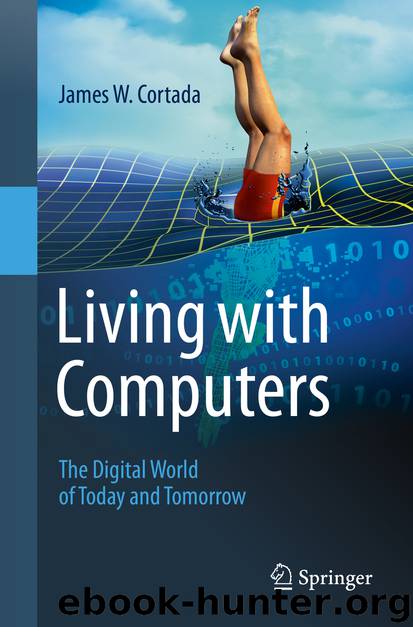Living with Computers by James W. Cortada

Author:James W. Cortada
Language: eng
Format: epub
ISBN: 9783030343620
Publisher: Springer International Publishing
Why the Issue Is Important
If I am correct, there are a number of consequences and issues to think about—the subject of our last chapter—some of which make sense to introduce now. Carried to its logical conclusion, it is the fact that we are using more computing, more sensors, and thinking increasingly about such topics as privacy and the uses of social media that is making information ubiquitous, almost as we think of the air we breathe. In other words, the more information with which we envelop ourselves, the less distinguishing the notion of an Information Age becomes. It is thus ubiquitous, ordinary, not distinguished by some uniqueness. We move on to the next area of evolution, perhaps to addressing climate change or getting serious about colonizing other planets and moons, issues that engage the cerebrum parts of our brains. We periodically pause, of course, to focus on such issues as cleaning up the air, installing some new form of computing and cogitating about its implications (e.g., biologically-based computing instead of our old metal, plastic and silicon ones), and fighting wars over ideology, religion, and economics. But as the world becomes more wired up, more functioning as a sensor-driven environment managed by AI, it will seem that life on earth is less about computing. That may seem counter intuitive, but we think about our times and how we will live them largely by what we focus on in a conscious way. If you are at war you think and act about that war; if you are in love, thoughts about living in an Information Age disappear as you focus on a single individual.
We already know what is driving us toward an era where we discuss information less and focus more on other matters. AI and computerized sensors are the most immediate and obvious influencers; so too portable electricity (energy) that can be placed where needed, either with batteries or technologies that generate it by various means.
Does this mean we lose (give up) our jobs or that society—Earth—will make it possible to spend all our time at the beach swimming and playing with friends and relatives? For decades too many futurists predicted that our work weeks would shorten, that we would all be paid a salary by the government for just existing, and that for many work was no longer necessary. Some were marginally correct: work weeks shortened over the past 150 years, Finland experimented giving people a base salary, but we all still work, children still need to be educated, too many people cannot abide just sitting around doing little or nothing, and individuals are curious enough to want to find solutions to new problems. All of that is going on before we even consider that our societies and religions call upon us not to just hang out at the beach all day. The value systems humans developed to survive and thrive over many hundreds of thousands of years will not be overturned so quickly to be replaced by one in which humans are cuddled by computers, sensors, and their robotic henchmen.
Download
This site does not store any files on its server. We only index and link to content provided by other sites. Please contact the content providers to delete copyright contents if any and email us, we'll remove relevant links or contents immediately.
Algorithms of the Intelligent Web by Haralambos Marmanis;Dmitry Babenko(17574)
Jquery UI in Action : Master the concepts Of Jquery UI: A Step By Step Approach by ANMOL GOYAL(10028)
Test-Driven Development with Java by Alan Mellor(7749)
Data Augmentation with Python by Duc Haba(7624)
Principles of Data Fabric by Sonia Mezzetta(7394)
Learn Blender Simulations the Right Way by Stephen Pearson(7306)
Microservices with Spring Boot 3 and Spring Cloud by Magnus Larsson(7155)
Hadoop in Practice by Alex Holmes(6690)
RPA Solution Architect's Handbook by Sachin Sahgal(6530)
The Infinite Retina by Robert Scoble Irena Cronin(6233)
Big Data Analysis with Python by Ivan Marin(5956)
Life 3.0: Being Human in the Age of Artificial Intelligence by Tegmark Max(5534)
Pretrain Vision and Large Language Models in Python by Emily Webber(4914)
Infrastructure as Code for Beginners by Russ McKendrick(4668)
Functional Programming in JavaScript by Mantyla Dan(4508)
WordPress Plugin Development Cookbook by Yannick Lefebvre(4404)
The Age of Surveillance Capitalism by Shoshana Zuboff(4270)
Embracing Microservices Design by Ovais Mehboob Ahmed Khan Nabil Siddiqui and Timothy Oleson(4160)
Applied Machine Learning for Healthcare and Life Sciences Using AWS by Ujjwal Ratan(4150)
